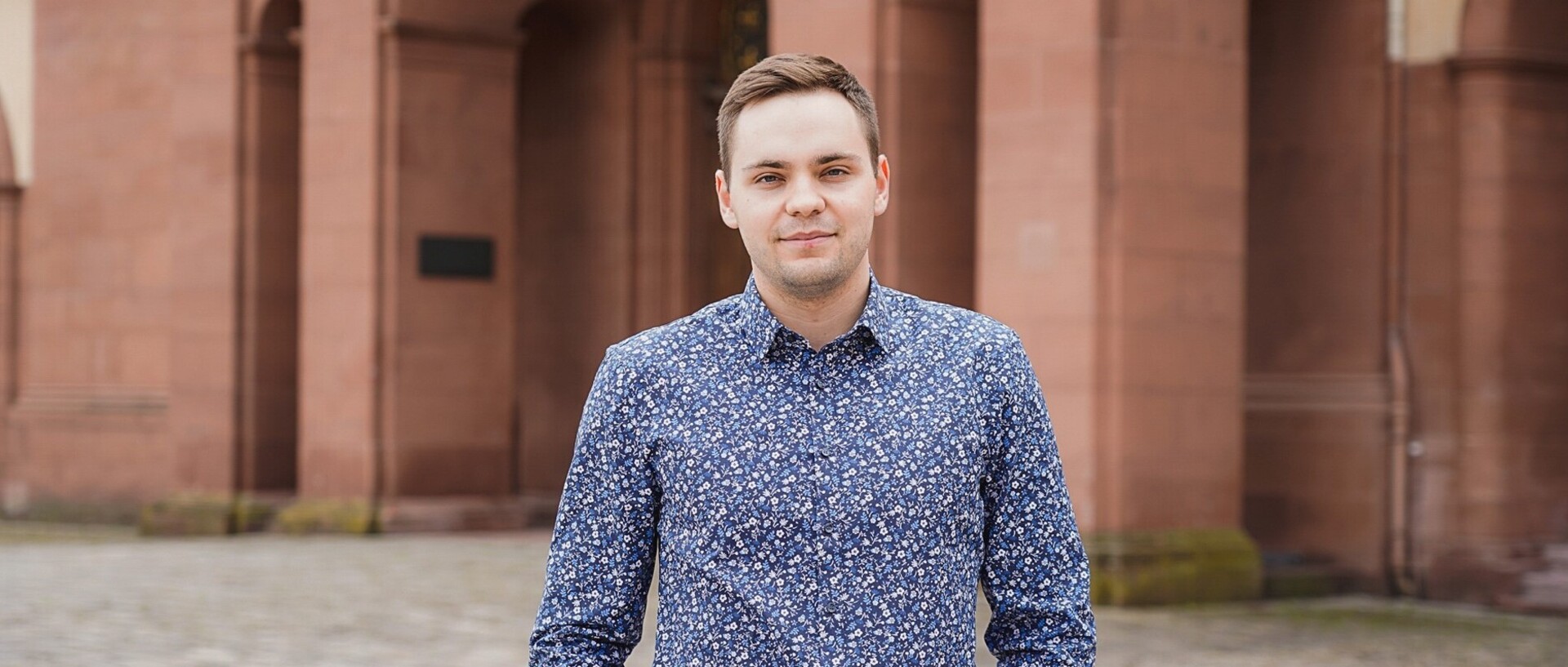“Studying Abroad Is Definitely Worth It”
Dmitrii Ianovici came to Germany from Moldova* six years ago, intending to take up his studies here. Currently, the 25-year-old is in his second semester of the master's program in Economics and holds an Opportunity Mannheim Scholarship from the University of Mannheim Foundation. In the present myUniMA story, you can find out why Dmitrii can hardly speak Moldovan, what the scholarship means to him and what recommendation he would like to share with other international students.
Why did you choose to study at the University of Mannheim and how do you like it here so far?
I have already completed my bachelor's degree in Economics at the University of Mannheim. The main reason why I decided to study here certainly was the university’s good reputation. I did not apply at any other university and luckily it worked out. In my home country, Moldova, I had already started studying Economics, so I knew that I wanted to study Economics here as well. It was also clear to me right from the beginning that I wanted to study in Germany, because there are much better career prospects here. In Moldova, a university degree is hardly worth anything. So, it doesn't really matter whether you have completed a program of study or not. Studying in Germany is much more difficult and complicated, but I like that because I realize that what I'm doing here is of value and challenges me.
What was the biggest challenge for you at the beginning of your studies?
Before I came to Germany, I had learned some German, but when I arrived here, I realized that I actually only had a basic knowledge of the language. That's why I took another German course and then switched to the Studienkolleg, where international prospective students can prepare for studying at a German university. At the beginning of my studies, understanding the subject matter was more demanding for me than mastering the new language. At the beginning of the master's program, however, the focus was once again on the language as the master's program is taught entirely in English. This is quite demanding for me because I learned hardly any English at school. Unlike many other international students, I now speak German better than English.
How are you coping with the changes with respect to online teaching?
It makes things a lot easier for me because I also have a part-time job and now I don't have to commute that much. A big disadvantage, however, is of course the fact that I do not have as much contact with other students as before. In the master's program, however, it is easier to keep in touch because we are a much smaller group of students than in the bachelor's program and we work together on projects. Therefore, I think that online teaching would have been a bigger problem for me during the bachelor's degree.
What do you miss most from your home country Moldova?
Due to the coronavirus pandemic, the last time I was in Moldova is almost two years ago, unfortunately. However, I don't miss seeing my family too much, because I keep in good contact with them even from abroad. Yet, I miss speaking my native language, Russian. I come from Moldova, however, the country was divided after the disintegration of the Soviet Republic. The part of the country where I live is called Transnistria and has seceded from Moldova as an independent republic. That is why I speak Russian and not Moldovan, even though I am from Moldova. I also sometimes miss Moldovan food, because I cannot cook as well as my mother and grandmother. In Mannheim, there are Russian supermarkets, but unfortunately there is no Russian restaurant.
You currently hold an Opportunity Mannheim Scholarship. In what way has the scholarship made it easier for you to study?
During my bachelor's degree, a law came into force requiring students from non-EU countries to pay tuition fees in Baden-Württemberg. This rule did not apply to me in the bachelor's program, but now, in the master's program, I have to pay the fees. Without the financial support of the Opportunity Mannheim Scholarship, studying would not have been feasible for me, because I have to finance my studies completely on my own and cannot afford the fees with my income. I have already been supported by the Opportunity Mannheim Scholarship for two semesters and hope to be a scholarship holder until I complete my master's degree. The scholarship is a great relief for me and enables me to study in Mannheim, and I am very grateful for that.
Do you have any advice you would like to share with other international students who want to study in Mannheim or in Germany?
I think everyone is afraid of new challenges at first, but from my experience I can say: It is definitely worth it. It's worth learning the language and moving to another country because you learn so much and have so many exciting experiences. Even if you think it will be hard and challenging, you will never know what you can accomplish until you try it.
* Dmitrii calls his homeland “Moldova”, which is more common in terms of language usage. The country's official name, however, is “Republic of Moldova”.
Text: Rebecca Schanze / June 2021
